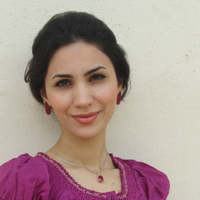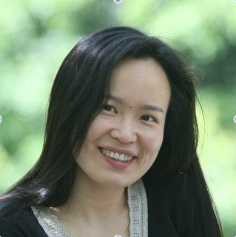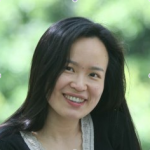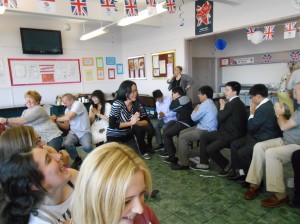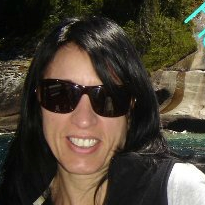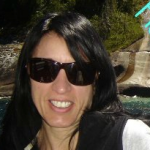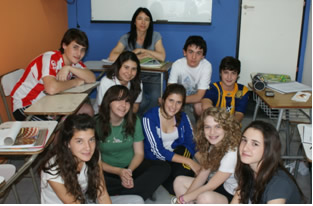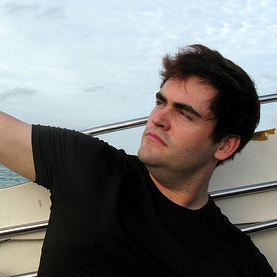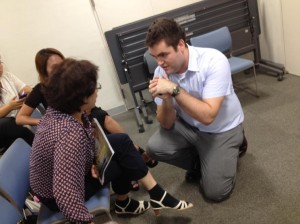Maryam Fazeli is an MA student of TEFL at Guilan University in Iran. She’s an English teacher and lives in Rasht, Iran. She’s currently conducting research on Demotivation and teaches English in language institutes. She’s passionate about helping others and psycholinguistic issues. She’s a music lover and an avid gardener. She believes that a successful teacher primarily should be a motivated motivator of students to desire learning. Furthermore, she agrees with this statement that a person who dears to teach must never cease to learn.
What are you passionate about, Maryam?
I’m Maryam Fazeli from Iran. I’m an EFL teacher and MA student of TEFL at Guilan University in Iran. Currently I’m working on my thesis project focused on demotivating factors among English major students at university level. I’ve always been interested in helping others and in communication. I’m a passionate teacher who’s passionate about motivating her students, developing in her teaching carrier and helping her students to develop to become an independent learner who has reached to her own voice. As a person, I really enjoy playing and listening to music especially Iranian traditional music and classical music. Walking with friends, gardening and writing diaries are activities that I spend my free time with.
How and why did you become a teacher?
My teacher at elementary school used to tell me that I was just cut out for teaching! And I believe she was a wonderful foreteller who was true indeed ;). My interest in English language was roused when I was a teenager. Fortunately I was lucky enough to have a really affectionate English teacher whose behavior was greatly encouraging and persuading, and certainly her high EQ brought about the discovery of my interest in English learning. From then I decided to study English related majors at university. In my view teaching is the mother of other professions, because it is teaching that teaches all the other professions. Therefore, its fundamental role in a society is indisputable and its major goal must be to empower the learners to think independently and creatively and to have their own voices.
What are you most interested in right now, Maryam?
I’ve always been interested in psychological issues and specifically in my field of study psycholinguistics. One of the issues that is very fundamental in education is motivation, because no individual is able to start an action and keep doing an activity without having enough motivation to do so. In education teachers have significant roles in raising this interest and motivation in their students and also have effective roles in demotivating them. Right now I’m engaged in doing research on demotivation which is a major problem of English learners. I’m going to explore the demotivating factors for English major students. As a teacher I’d extremely like to integrate technology as much as it is possible in my teaching. And find the ways of teaching that meet my students’ needs.
What things do you do to help you get better at being a teacher?
In order to teach a subject successfully, you need to stay on the ball for the latest developments in the area all the time. Language learning is so extensive and complicated because it is a culture and social related subject. Therefore, for a non-native teacher the job is much more challenging than it is for a native teacher. I try to read new published articles and books. They are extremely helpful to me to become a more professional teacher both theoretically and pedagogically. The other way of developing is to connect with other teachers from different countries and exchange ideas about teaching and my problem areas. They always have something new for me! Conferences and workshops are also places where we can learn a lot from professionals. Something very important for a teacher to have useful teaching experiences is listening to her students very carefully and evaluating her achievements. These are activities that we teachers must do constantly otherwise we will not develop professionally nor will our students benefit from our classes!
What’s the biggest challenge you face as a teacher?
I am teaching English as a foreign language in a context in which there are a few English native speakers and English learners have very few opportunities to practice real language use in a real situation. So one of the biggest challenges that I face is looking for more such opportunities and ways that my students can practice real language use. Certainly a very good solution that is beneficial is social media. It provides a vast and variable amount of communication for students. However, to get them using it, I have to previously prepare them for such practices.
What advice would you give to a teacher just starting out on a journey of professional development?
Any teacher has its own style for developing: here is some of my advice for you according to my experiences. One point is that we have to put in practice our knowledge of teaching that we learn from books or hear from others. Mere knowing is useless. We should act upon this learning in our classes. The other fundamental point that we always should consider is our students’ specific styles and needs. Every class and every individual has a particular style, needs, and goals. All the decisions that we make should be based on these things. Communicating and cooperating with obliging colleagues are convenient ways of developing professionally. Also attending workshops and conferences keeps you up to date with the latest developments. And finally something that you should never forget is to be a passionate teacher. Appear in the class zealously and attempt to raise your students’ interest in learning. That’s the key of success!
Is there any blog or online link you’d like to recommend?
There are many of them, but a person can choose those that meet her needs. Following are those that I really benefit from:
this link introduces 100 best video sites for educators:
http://edudemic.com/2012/08/best-video-sites-for-teachers/
http://www2.smo.uhi.ac.uk/clilstore/
http://home.hiroshima-u.ac.jp/flare/EnglishStudySite.html
What’s your favorite quotation about being a teacher?
“A teacher who is attempting to teach without inspiring the student with a desire to learn is hammering on cold iron.” – Unknown
“It is the supreme art of the teacher to awaken joy in creative expression and knowledge.” — Albert Einstein
“Do not train a child to learn by force or harshness; but direct them to it by what amuses their minds, so that you may be better able to discover with accuracy the peculiar bent of the genius of each.” Plato

